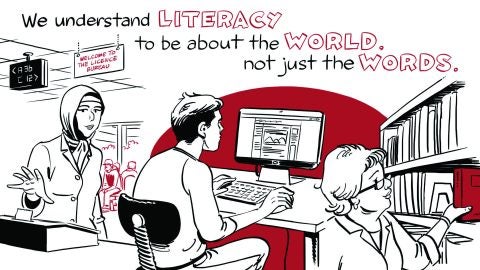
Toby Sanger and Isabelle Boucher | CUPE national staff
Pascal Colpron | Illustrations
When it comes to investing in the economy, the best investments are usually in people and basic skills training.
It is becoming ever more necessary for people to obtain and improve these basic skills for lifelong learning as technology and expectations of basic skills advance.
Consider these facts:
- Investment in education is three times as important to economic growth as investments in physical capital, such as machinery and equipment.
- Improving basic skills has a greater impact on the economy than increasing skills of those with higher literacy skills.
- 17 per cent of adult Canadians are at or below the bottom level for literacy. About half are below the minimum needed for many jobs.
- Those with lower literacy and basic skills are more likely to be long-term unemployed, depend on social assistance, or stay out of the labour force altogether.
Many people with only basic literacy and essential skills were forced to leave school early to support their families or couldn’t afford the rising cost of further education. But it’s not just those with less formal education who can benefit from literacy and essential skills’ upgrading: about 6 per cent of those with post-secondary education are also at basic literacy levels.
The benefits of improving literacy and essential skills are much more than just economic. In some cases it can mean a difference between life and death if workers can’t understand health and safety instructions. These skills are also important for financial literacy, so workers can be sure they’re receiving what they’re owed by employers, governments, or businesses.
Adult learners who have been through literacy training have had their lives positively transformed. Their confidence increases, they get better jobs, and some have gone on to teach, write books or become political leaders.

The benefits span generations. Members enrolled in CUPE 500’s essential skills program reported that one of the most important benefits was being a better role model for their children.
Because those with lower literacy and essential skills also tend to have lower incomes and are less likely to vote or be politically engaged, improving these skills can make a major difference in reducing inequalities of income and of political power.
Funding for these programs comes from a variety of sources, but largely from the provinces. Public funding is especially important because Canadian employers invest little in training for workers themselves. Liberal and Conservative governments have gradually eliminated federal skills training programs, in some cases transferring programs, staff and funding to the provinces.
The $500 million provided in annual support through Labour Market Agreements to the provinces has been a major part of funding for literacy and basic skills. LMA funding is geared towards the majority of workers who don’t qualify for employment insurance-funded programs, and these programs have been very successful. Eighty-seven per cent of LMA participants get a job, 87 per cent gain specific skills credentials, and participants increase their earnings by an average of $323 a week following the program. By this measure alone, every dollar of federal funding helps provide fifteen times that in higher earnings for these workers for just one year.
Unfortunately, in its 2013 budget the Harper government announced they planned to slash funding for these programs by 60 per cent. In May 2014, literacy organizations across Canada that received core funding through the federal Office of Literacy and Essential Skills saw their applications for further funding denied.
If there’s good news it’s that opposition has unified, with CUPE joining literacy organizations across Canada, along with all provincial governments, experts and those affected to condemn the cuts.
“We hear over and over about how the labour force and quality training are the backbone of our economy. We couldn’t agree more,” said CUPE National President Paul Moist. “That’s why I’m so stunned that the Harper government would go after basic training and skills programs like this. If the economy really is a priority for this government, you’d think they would invest in training workers.”

CUPE has been a labour movement leader in promoting literacy and essential skills. We have an active Literacy Working Group with members and activists in every province. Our locals have initiated a number of successful literacy programs through their workplaces that have helped many members. CUPE is also active in the LMAworks.com coalition where supporters share stories of success and advocate for continued funding for these programs.
Visit LMAworks.com or contact Isabelle Boucher, CUPE’s Literacy Coordinator (iboucher@cupe.ca) for more information.


